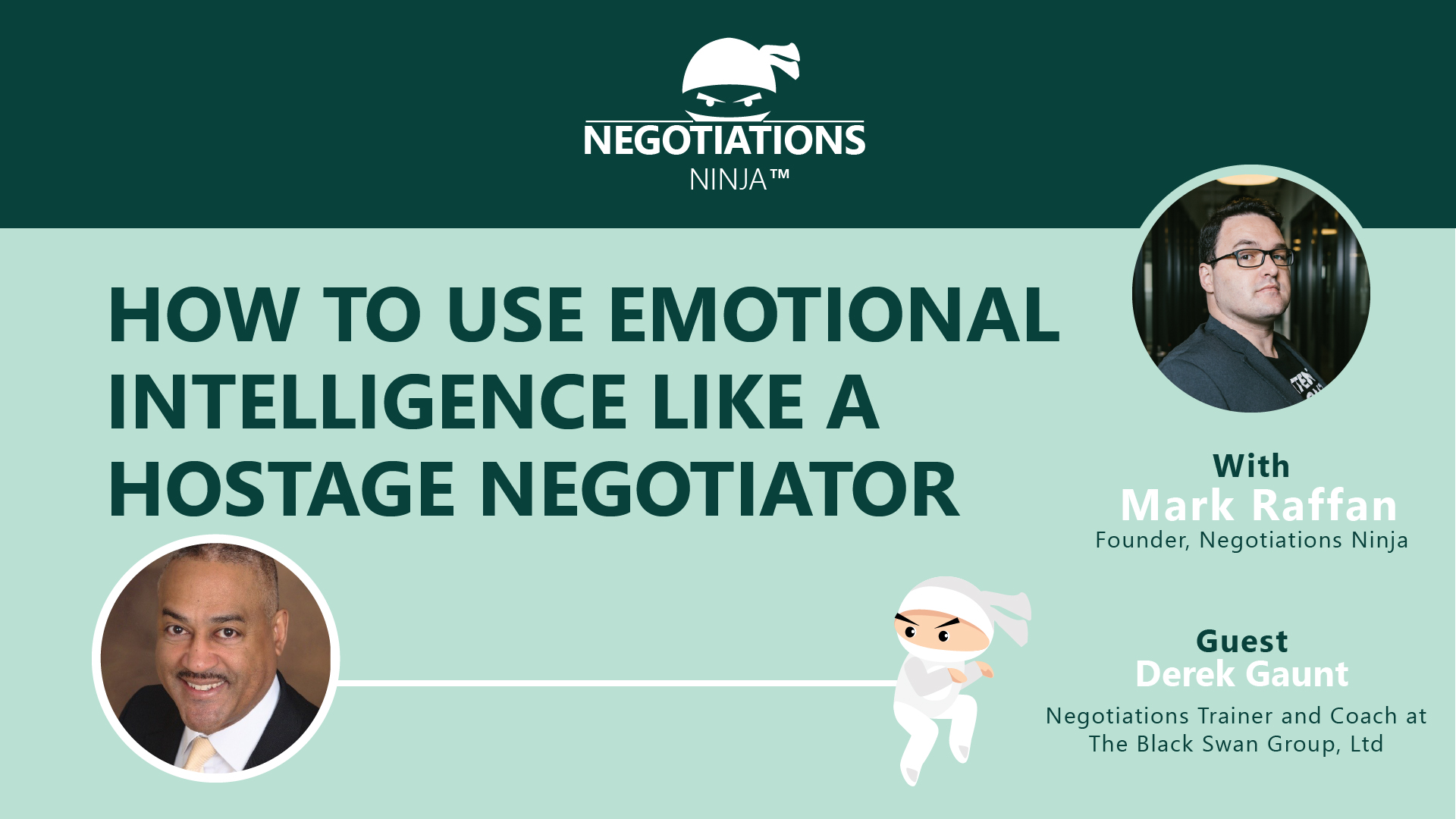Did you know that the principles a hostage negotiator uses to negotiate with a hostage-taker can be applied to leadership? It seems far-fetched, I know. But Derek Gaunt takes the concept and drives it home in his book, “Ego, Authority, Failure: Using Emotional Intelligence Like a Hostage Negotiator to Succeed as a Leader.”
In this episode of Negotiations Ninja, we get into the specifics of the hostage negotiation framework, tactical empathy, the ability to build emotional control into conversations, and how to be an overall better leader. Do not miss this incredible conversation with a true master of negotiation.
Outline of This Episode
- [2:06] Learn more about Derek Gaunt
- [3:33] The hostage negotiation framework
- [9:14] How to mitigate defensiveness
- [11:30] Embrace a curious mindset
- [16:46] Maintaining emotional control
- [20:51] How to coach a “Blue Flamer”
The hostage negotiation framework
The hostage negotiator leadership framework is a unique approach where you adopt viewing your colleagues and superiors as hostage-takers. You handle conversations with them with the same level of deference and subordination as you would with hostage-takers.
Most leaders and managers fail because they don’t understand the degree of impact their words and behaviors have on the people they’re interacting with.
But hostage negotiators are always focused on how they’re saying something and its degree of impact. If you can get leaders to adopt that mindset, they’ll create an environment with less pushback from their team and more willingness to tackle what’s asked of them.
Most leaders think they have to bark commands 24/7, and they shouldn’t. It will have a toxic effect on the people they lead. Heavy-handed and controlling management tactics create employees that leave or, worse—employees who “check out” but don’t leave.
If you don’t handle your employees with deference, you make them uncomfortable. It can lead to resentment. They may not have the hierarchy that you do, but they can make life difficult. When the opportunity for payback presents itself, they will take it. That may look like sloppy work product, constant excuses, or constant use of personal time.
So before you open your mouth, ask yourself, “How is this going to affect them?” How will your words affect the ultimate outcome you’re seeking? Your job is to get in front of the moves you make.
When you ask people to do things, the future becomes uncertain. Their defenses rise. You need to mitigate those defenses going up before making the ask. You mitigate defensiveness by doing an “Accusations audit.”
The Accusations Audit
An accusation audit is when you make an insightful and intelligent guess about what’s going on with the recipient of your message and speak it out loud. What negative emotions and dynamics might be associated with it?
If you decide to move the water cooler from one side of the office to the other, 2-3 out of 12 people will have a problem with it. Before you make the announcement, you can say, “I know this is going to be an imposition for some of you. Some of you think this seems disorganized…”
Accurately determining what their objections might be isn’t as important as the attempt. You’re telling them that your message isn’t all about you and that you do have their interests in mind. You’re standing up and pointing out the blemishes of your ultimate ask. It is courageous and selfless and demonstrates tactical empathy.
Tactical empathy encourages reciprocity. Your direct reports are now more likely to return the favor. They may still not like the decision, but you’ll get far less pushback.
Embrace a curious mindset
Derek asks you to do one thing: Take a step back and remind yourself that you’ve got something to learn from every conversation. That curious mindset helps you uncover what’s really important to the other side.
Especially because people rarely say what they mean. They ask poor questions that don’t get the answers they want. If they ask someone, “What are you doing after work?” that person will immediately get defensive. They’ll question how their life is going to change based on their answer. They don’t want to tip their hand.
But if they have a curious mindset, they will say, “It sounds like you have a reason for asking.” It’s usually not a readily apparent answer. Their response might be, “My car is in the shop, and I know you drive past it to get home. Can you give me a ride?” It’s the question that they wanted to ask.
That’s why a curious mindset is important. You have to go into a conversation judgment free, assuming that you have something to learn. “Why” questions must be top of mind. When you do this, it will help you stay on the hunt for buried information, which can change the direction of the conversation when uncovered.
How do you manage your emotions in tense negotiations? How do you succeed as a leader of blue-flamers? Listen to the episode to learn more about using emotional intelligence like a hostage negotiator.
Resources & People Mentioned
- Never Split the Difference by Chris Voss
Connect with Derek Gaunt
- The Black Swan Group
- Connect on LinkedIn
- Ego, Authority, Failure: Using Emotional Intelligence Like a Hostage Negotiator to Succeed as a Leader.
Connect With Mark
- Follow Negotiations Ninja on Twitter: @NegotiationPod
- Connect with Mark on LinkedIn
- Follow Negotiations Ninja on LinkedIn
- Connect on Instagram: @NegotiationPod




